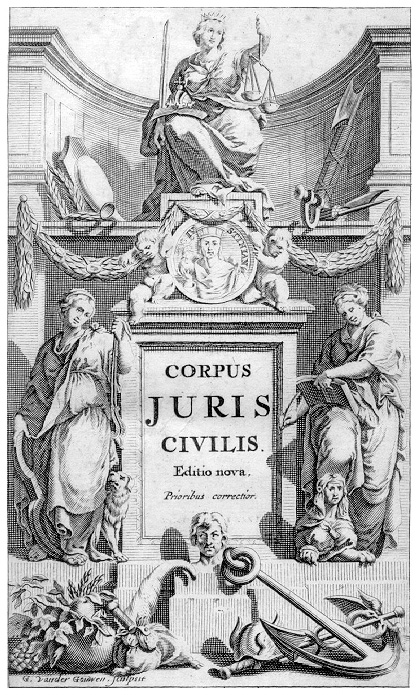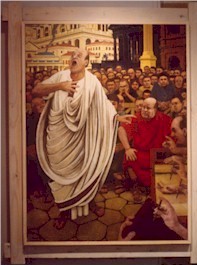රෝමන්වරුන් ලොවට දායද කළ තවත් විශිෂ්ට කාර්යයක් වන්නේ ඔවුන්ගේ නීතියයි. නීතිය ඉදිරියේ සියලු දෙනා සමානය යන්න ඔවුන්ගේ පිළිගැනීමයි. ණීතිය ඉදිරියේ සැකයෙන් තොරව චෝදනා ඔප්පුවන තුරු ඔහු නිවැරදිකරු ලෙස සැලකීම මෙහි හරයයි. ඳැනට ලංකාවේ ව්යවහාර වන්නේ රෝම-ලන්දේසි නීතියයි.

ජස්ටිනියන් නම් රෝම අධිරාජ්යයා (Justinian) ගේ පාලන කාලයේ එනම් ක්රි.ව 527-565 කාලයේ රෝමයේ ශ්රී විභූතිය උපරිම වීය. ස්පාඤ්ඤය, අප්රිකාව ඊට යටත්ව තිබුණු අතර කලාව, ගෘහ නිර්මාණ ශිල්පය හා නීතිය අතිශයින්ම සංවර්ධනය වීය. එම කාලයේ රෝම නීති ප්රතිසංස්කරණ ඇතිවූ අතර පසුව එම නීති සංග්රහය Corpus Juris Civilis නමින් පළ කෙරුණි. එය ඉන් පසුව ඇතිවුණු යුරෝපීය බයිසෙන්ටියානු සමාජය විසින් නීති පදනම කර ගත් අතර වසර 800 ක් යන තුරුම යුරෝපියානු නීතියේ පදනම වීය. එය අද බොහෝ රටවල සිවිල් නීතියේ සම්ප්රදාය ලෙස සැලකේ.

Lex Duodecim Tabularum නමි නීති වගු 12 රෝම නීතියේ ආරම්භක පනම වූ අතර එය පාසැල් ගිය සැම අයකුම හවතින් දැන සිටිය යුතු විය.
TABVLA I (Civil procedure) සිවිල් නීතිය
TABVLA II (Civil procedure)සිවිල්
TABVLA III (Debt) ණය නීතිය
TABVLA IV (Parents and children) - ළමුන් සහ දෙමාපියන්
TABVLA V (Inheritance) - ප්රවේණිය
TABVLA VI (Property) - දේපළ
TABVLA VII (Real Property) - දේපළ
TABVLA VIII (Torts)
TABVLA IX (Constitutional principles) ව්යවස්ථා මූලධර්ම
TABVLA X (Funeral regulations) - මළවුන්ගේ අවසන් කටයුතු
TABVLA XI (Marriage) - විවාහය
TABVLA XII (Crimes) - අපරාධ
TABVLA II (Civil procedure)සිවිල්
TABVLA III (Debt) ණය නීතිය
TABVLA IV (Parents and children) - ළමුන් සහ දෙමාපියන්
TABVLA V (Inheritance) - ප්රවේණිය
TABVLA VI (Property) - දේපළ
TABVLA VII (Real Property) - දේපළ
TABVLA VIII (Torts)
TABVLA IX (Constitutional principles) ව්යවස්ථා මූලධර්ම
TABVLA X (Funeral regulations) - මළවුන්ගේ අවසන් කටයුතු
TABVLA XI (Marriage) - විවාහය
TABVLA XII (Crimes) - අපරාධ
TABVLA I (Civil procedure)
If someone is called to go to court, he is to go. If he doesn't go, a witness should be called. Only then should he be captured.
If someone is called to go to court, he is to go. If he doesn't go, a witness should be called. Only then should he be captured.
If he shirks or flees, he should be captured. If illness or old age is an impediment, let him be given a carriage. If he doesn't want it, it should not be covered.
citizen can be surety for a proletarian.
When parties have made an agreement, announce it. If they don't agree, they shall state their case in the Forum before noon. They shall plead together in person. After noon, let the judge pronounce. If both are present, the case shall end at sunset.
TABVLA II (Civil procedure)
Serious illness. . . or else a day appointed with an enemy; . . . if any of these is an impediment for the judge or any party, on that day proceedings must end.
One who seeks the testimony from an absent person should wail before his doorway every third day.
TABVLA III (Debt)
A person who admits to owing money or has been adjudged to owe money must be given 30 days to pay.
After then, the creditor can lay hands on him and haul him to court. If he does not satisfy the judgment and no one is surety for him, the creditor may take the defendant with him in stocks or chains. He may bind him with weights of at least 15 pounds. The debtor may live where he wishes. If he does not live on his own, the creditor must give him a pound of wheat a day. If he wants to he may give more.
On the third market day, (creditors) may cut pieces. If they take more than they are due, they do so with impunity.
Against an enemy, the right of property is valid forever.
TABVLA IV (Parents and children)
An obviously deformed child must be put to death.
An obviously deformed child must be put to death.
If a father sells his son into slavery three times, the son shall be free of his father.
TABVLA V (Inheritance)
If a person dies intestate without heirs, the nearest male kinsman shall inherit. If there is no near male kinsmen, his clansmen shall inherit.
If a person dies intestate without heirs, the nearest male kinsman shall inherit. If there is no near male kinsmen, his clansmen shall inherit.
If someone goes mad, his nearest male kinsman shall have authority over his property.
TABVLA VI (Property)
When someone makes bond or conveyance and announces it orally, right shall be given.
When someone makes bond or conveyance and announces it orally, right shall be given.
No one must displace beams from buildings or vineyards.
TABVLA VII (Real Property)
Build roads; if they become dilapidated, passersby can drive their beasts where ever they want.
Build roads; if they become dilapidated, passersby can drive their beasts where ever they want.
If rainwater does damage, he shall be made to fix it by the judge.
TABVLA VIII (Torts)
Those who have sung an evil spell. . .
Those who have sung an evil spell. . .
If one has maimed another and does not buy his peace, let there be retaliation in kind.
Someone who breaks another's bone by hand or club must pay 300 sesterces; for a slave, 150; if he has done simple harm against another, 25.
Someone who charms away crops, or another's corn. . .
If a patron defrauds his client, let him be outlawed.
If one has been called to witness, or hold the scales, unless he gives his testimony, let him be dishonoured and incapable of further testimony.
If a weapon flies unaimed from your hand, you will owe a ram.
TABVLA IX (Constitutional principles)
4. The penalty shall be capital for a judge or arbiter legally appointed who has been found guilty of receiving a bribe for giving a decision.
4. The penalty shall be capital for a judge or arbiter legally appointed who has been found guilty of receiving a bribe for giving a decision.
5. Treason: he who shall have roused up a public enemy or handed over a citizen to a public enemy must suffer capital punishment.
6. Putting to death of any man, whosoever he might be unconvicted is forbidden.
TABVLA X (Funeral regulations)
No dead man may be cremated nor buried in the City.
When a man wins a crown, or his slave or cattle win a crown for him, . . .
No one must add gold (to a funeral pyre). But if his teeth are held together with gold, and are buried or burnt with him, it shall be with impunity.
TABVLA XI (Marriage)
Marriages between plebeians and patricians are forbidden.
Men in the army may not wed until training is complete.
TABVLA XII (Crimes)
If a slave has committed theft or harm. . . .
Someone who has brought a false claim shall be brought before three judges, and shall pay a double penalty.








 ශිල්ප 64
ශිල්ප 64